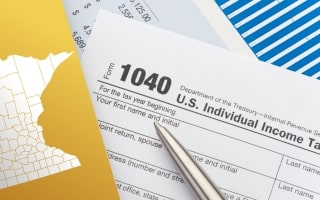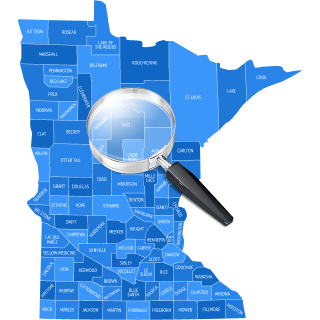Property Tax Records in Minnesota

From location to the size of the down payment you wish to make, there are many factors you need to consider when buying a home in Minnesota. One factor that's often overlooked involves property taxes. When you purchase any type of home in Minnesota, you'll receive an annual tax bill that you must pay in full to avoid delinquent taxes.
These taxes are collected by your county assessor. While tax rates are different in each county, property owners in large cities have higher tax rates than those who live on rural properties. The average property tax rate in Minnesota is around 1.02%. In comparison, the national average is just under 1%.
While the exact dates can vary depending on the county you live in, you can expect your property taxes to be due in May or October. These taxes can be paid online or in person. While Minnesota received statehood in 1858, property taxes had already been collected for nearly a decade. In 1849, a property tax levy was created to support local school systems. Property taxes were the main source of funding in Minnesota until the 1920s.
Property Tax Assessment in Minnesota

If you want to know how your property taxes are calculated in Minnesota, there are two factors you must consider. Along with your property's market value, Minnesota also uses your net tax capacity to perform this calculation. To identify your net tax capacity, you must first subtract all available exclusions from the home's market value. An example of this type of tax credit is the homestead exclusion, which is available for most owner-occupied residences. There are other exclusions that you may qualify for, so it's best to do your research to see if you and your family can lower your overall tax burden.
Once you subtract various exclusions, you'll need to multiply the taxable market value by the property's class rate, which will give you the net tax capacity. The type of property you own determines the class rate. Residential homesteads below $500,000 have a class rate of 1%, which means that a home valued at $450,000 has a net tax capacity of $4,500.
The second tax that will be applied to your property is the market value levy. Minnesota doesn't calculate assessed property values like most states do. Market value levies often need to be approved by voters.
If your market value tax rate is 0.10% on a $450,000 home, you'll need to add another $450 to your taxes. In total, you'll have a tax bill of $4,950. As mentioned previously, the average tax rate in Minnesota is right around the state average. The tax rates for the most populous Minnesota counties are:
- Hennepin County: 1.32%
- Ramsey County: 1.47%
- Dakota County: 1.17%
- Anoka County: 1.17%
- Washington County: 1.24%
Calculate Minnesota Taxes
Smart homeowners and real estate investors use a Minnesota property tax calculator to better understand how property taxes are calculated in the state. This tool simplifies the process by allowing users to input key property details, such as location, estimated market value, and property classification, to estimate their annual tax assessment and liability based on local levy rates and state tax policies.
A Minnesota property tax calculator can also help identify exemptions and tax relief programs you may qualify for. Property taxes in Minnesota are based on the estimated market value and tax capacity of the property, with rates varying depending on property type and location. Available relief programs include the Homestead Market Value Exclusion, which reduces the taxable portion of a home’s value for owner-occupied residences, and the Property Tax Refund Program, offering income-based refunds for homeowners and renters. Additional relief is available for senior citizens, disabled homeowners, and veterans, making the calculator a helpful tool for uncovering potential savings.
using our property tax calculator.
Minnesota Property Tax Records: What Are They?

When you pay property taxes in Minnesota, the money goes to your county. Each county in the state has special taxing districts that collect some of these funds. The money that the county receives from property taxes pays for school districts, townships, cities, and other taxing districts within the county. The types of public services that are funded with property taxes include the following:
-
Fire stations
-
Public schools
-
Libraries
-
Police protection
-
Streets
Whether you currently own a Minnesota home or want to buy one, you can look up information about the property and any taxes you might need to pay by accessing tax records. The State of Minnesota Data Practices Act mandates that this type of information be made publicly available in each county.
In Hennepin County, you can find tax records and other information about the property by entering an address, ID number, or description. You can also bring up an interactive map that can help you find a specific property. Once you enter the necessary information and bring up the property, you'll be able to view data like:
-
Current year taxes due
-
Tax data from previous years
-
Map of the property
-
Latest recording history
-
Current values
-
ID number and address
-
School district
-
Construction year
-
Owner name
-
Sales history
-
Tax parcel description
-
Taxable market value
-
Property type
-
Homestead information
Property Tax Exemptions and Deductions in Minnesota

If you're looking for ways to reduce your annual property taxes, consider applying for an exemption. There are plenty of Minnesota property tax exemptions, credits, and deductions for property owners. The purpose of an exemption is to reduce a property's taxable value. A lower value leads to reduced property taxes. Here are some of the exemptions you can choose from.
Homestead Market Value Exclusion: A homestead is any property that you use as a principal place of residence. If your property is classified as a homestead, you may qualify for several exemptions and exclusions.
This exclusion reduces your property's taxable value, which is similar to its market value. In 2024, the max exclusion amount is $30,400 on homes that are valued at $76,000. The exclusion amount lowers with higher property values and phases out entirely at $413,800.
Veteran with a Disability Market Value Exclusion: With this exclusion program, veterans who have a disability can earn a market value exclusion that's as high as $300,000. The exclusion amount you qualify for depends on your disability rating.
The market value exclusion is $300,000 for veterans with a 100% disability rating. It drops to $150,000 for veterans with a disability rating of 70%- 99%. Surviving spouses and qualifying family caregivers may also qualify.
Senior Citizen Property Tax Deferral: The purpose of this program is to help senior citizens who are at least 65 years old defer a portion of their property taxes. You can only qualify if you earn less than $96,000 in household income. You must also live in your home for at least five years.
Once you apply for this deferral, you'll only need to pay 3% of your total property taxes. However, all remaining taxes must be repaid if you sell your home.
How To Search Property Tax Records in Minnesota

If you want to find property records in Minnesota, there are a few platforms and online databases that provide this service. Every county in Minnesota provides homeowners, buyers, and investors with access to property tax records and other useful information. You can find this database on the county's website. From here, enter the property address or another piece of information to find records for a specific home.
You can get the same information from a third-party tool, such as PropertyChecker. This platform offers parameters like parcel ID, address, and owner's name, which you can use to find the property you wish to know more about. This search can take a minute or two to finish. The types of documents you'll have at your disposal once the search is done include the following:
-
Deeds
-
Lien records
-
Loan records
-
Foreclosure information
-
Data on previous sales
-
Property tax records
-
Owner names
-
Market value and taxable value
-
Relevant property details like lot size and bedroom count
-
Building permits
-
Neighborhood info
How To Appeal Property Taxes in Minnesota

Once you receive your tax bill in the mail, thoroughly review it to ensure there aren't any errors or incorrect pieces of data that are causing your property taxes to be much higher than they should be. Although it's uncommon, county assessors sometimes make mistakes when calculating home values. If there are any errors, you should aim to fix them immediately to avoid any future problems.
If the assessor indicates that the market value of your home has increased by a substantial amount over the past year, it will likely be reflected in your notice of valuation. Minnesota provides homeowners with the opportunity to appeal these taxes. There are, however, deadlines that must be met, which is why it's highly recommended that you adhere to the following steps on how to navigate the appeal process. Fortunately for homeowners in Minnesota, the process to appeal isn't too complicated.
Step 1: Regardless of where you live in Minnesota, your tax statement will be mailed to you in March. You'll also receive your Notice of Valuation, which lists your home's taxable value. Once you have these documents, you can choose to appeal your home's valuation.
Step 2: When you own a home in Minnesota, you can submit an appeal about your property taxes to the County Board of Appeal and Equalization or the Minnesota Tax Court. If you take the first route, make sure you appeal to the Local Board before you do so with the County Board. You can make the appeal by letter or in person. During the hearing, the local assessor should be present.
Step 3: The Local Board of Appeal and Equalization holds appeal hearings from April 1 to May 31. You should be able to find info about these hearings on your valuation notice. When you arrive at this meeting, you must present evidence that proves your home's latest valuation isn't accurate.
Step 4: If the Local Board doesn't agree with your findings, you can file an additional appeal with the County Board of Appeal and Equalization. They hold hearings in June. The town or city you live in may have transferred its powers over to the county, which means that the County Board will be the first governmental agency you meet with during this process.
Step 5: If you don't get a favorable answer from the County Board, you can appeal to the Minnesota Tax Court. It's also possible to file directly to this court before you have an informal hearing with the Local Board. No matter which option you choose, you'll need to appeal by April of the following year.
How Property Tax Records Impact Real Estate Transactions in Minnesota

When a buyer is about to make an offer on a home or a seller wants to set an appealing listing price, they might consider property taxes. Property taxes and records are often part of real estate transactions. Since property taxes are higher in cities and urban destinations than in rural locations, buyers must consider how much they're willing to pay in taxes every year.
If you're buying a home in Minnesota, you can use property tax records to estimate how much you'll pay in annual taxes. Most property owners choose to separate their annual tax payments into 12 smaller ones that are folded into their monthly mortgage payments.
If you're selling a home in an urban location, consider property taxes when setting the ideal listing price. If you live in Minneapolis, the Hennepin County tax rate is among the highest in the state at 1.32%, which means that you may need to set a competitive listing price to appeal to potential buyers.
Property taxes are important to investors because they can change the entire calculus when evaluating the profitability of a rental. An investor may need to compensate for elevated property taxes by charging a higher rent. In Minnesota, investors have the option of buying tax-forfeited properties.
Minnesota has strict rules about how it handles unpaid property taxes. If you don't pay your taxes by May and October, they'll be considered late, after which interest begins to accrue. If you miss your payments for the entire year, Minnesota will consider them delinquent. At this stage, the property forfeiture process begins immediately. Minnesota property tax delinquency is taken seriously, so make sure you pay your property taxes on time every year.
In March, a Notice of Delinquent Taxes is sent. Shortly thereafter, a lien will be placed on your property for the amount of taxes you owe. In May, the state will gain an interest in your property. You'll then have three years to pay back your delinquent taxes. If you don't, a Notice of Expiration of Redemption will be sent in the mail. This notice indicates that your home will be forfeited in 60 days. Most tax-forfeited properties are sold to investors in online auctions.
Free Minnesota Property Tax Lookup
Tax Records Please wait...
Property Tax Guide
- Property Tax Records in Minnesota
- Property Tax Assessment in Minnesota
- Minnesota Property Tax Records: What Are They?
- Property Tax Exemptions and Deductions in Minnesota
- How To Search Property Tax Records in Minnesota
- How To Appeal Property Taxes in Minnesota
- How Property Tax Records Impact Real Estate Transactions in Minnesota
Instant Access to Minnesota Property Records
- Owner(s)
- Deed Records
- Loans & Liens
- Values
- Taxes
- Building Permits
- Purchase History
- Property Details
- And More!
Free Minnesota Property Tax Lookup
Tax Records Please wait...
Property Tax Guide
- Property Tax Records in Minnesota
- Property Tax Assessment in Minnesota
- Minnesota Property Tax Records: What Are They?
- Property Tax Exemptions and Deductions in Minnesota
- How To Search Property Tax Records in Minnesota
- How To Appeal Property Taxes in Minnesota
- How Property Tax Records Impact Real Estate Transactions in Minnesota